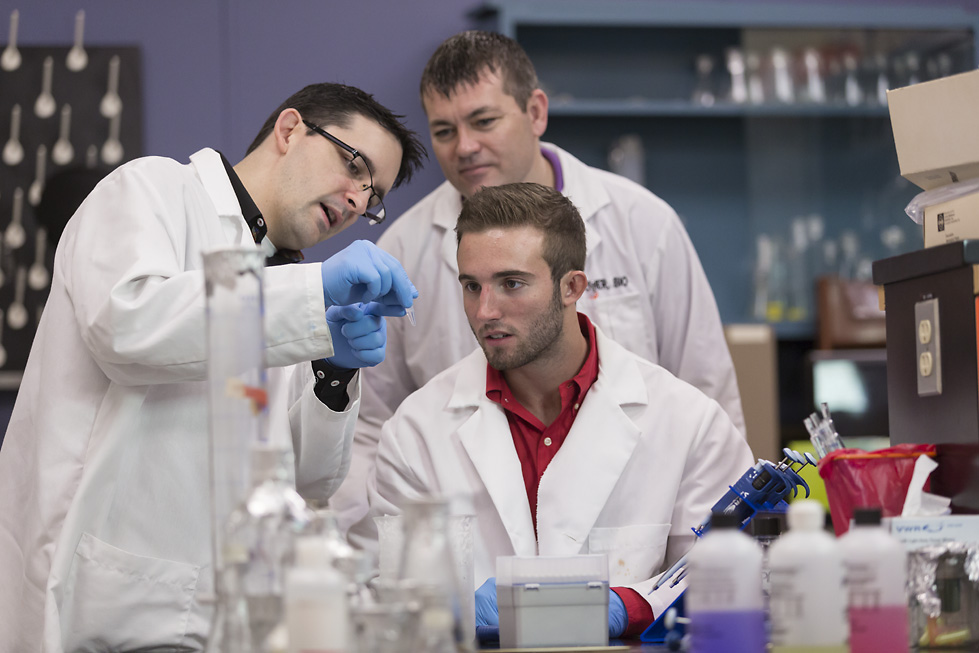Excellence: CANCER CURE IN DEVELOPMENT AT ORU
 An interview with Dr. William Ranahan, Associate Professor of Biology at ORU, begins
with this preface:
An interview with Dr. William Ranahan, Associate Professor of Biology at ORU, begins
with this preface:
"This story is pretty crazy," he says.
The thing is: he's not wrong. After all, what other word can succinctly sum up a story that includes the writings of a medieval monk, an abrupt career change, $50,000 out of nowhere, fungi that dine on cancer, and a student named after a mushroom?
Perhaps "Spirit-empowered" might do the trick.
But first things first. Ranahan is a 2005 graduate of ORU, who later obtained his Ph.D. in biochemistry and molecular biology with an emphasis on breast cancer. While a student here at ORU, Ranahan was taken with the University's insistence on hearing the voice of the Holy Spirit. This emphasis, combined with some God-ordained reading material, changed the course of his life.
"I found this book by [the French monk] Brother Lawrence, 'The Practice of the Presence of God'," he says. "And it said you can just talk. You can have an unbroken communication. There weren't set times to pray—it was just a lifestyle. So I started to try that, to have an inner dialogue that never ended. It just kept going."
Ranahan carried the practice with him through graduation and into his post-graduate work in a lab.
"I had hours and hours of mind-numbing, repetitive work," he says. "Instead of just going on autopilot, I talked to God. Because there was really nothing else to do! And during my third year of my doctorate, all these ideas popped in my head—ideas that worked really well. And our lab kind of took off."
Ranahan catapulted from a standard grad student to an award-winning one, and he was suddenly on track to become a prominent name in the field of cancer research. Until the Holy Spirit intervened once more.
"I heard my advisor from ORU was leaving to become a missionary," he recalls, "so I got in touch with her and heard about a job opening to take over her position. I read the job description and had this cold sweat and realized: they're looking for me."
He hadn't planned on becoming a professor, but both he and his wife knew God was calling him to teach at his alma mater. And that required a huge step out in faith.
"I had to trust that God had some reason for the path I was on," he says. "I had to be okay with letting go of research in order to teach."
It turned out he's a natural, especially in the Spirit-empowered, whole person education context.
"I'm not just interested in getting my students technically proficient. Research is 99% failure. We're going without a guide, but we don't have to. So we say, 'I'm going to put the tools in Your hands,' and then let God guide us. We're going to listen. We're going to have our eyes turned up even while we're working."
This posture led Ranahan to an unexpected breakthrough: mushrooms.
"All mushrooms have to figure out what they're living on and then release chemicals to break that down so they can eat," explains Ranahan. "If they can't figure it out, they starve. They adapt to their food source. So the question that popped into my mind was, 'What if you trained mushrooms to live off cancer cells? Wouldn't they then produce chemicals that are anti-cancer chemicals?'"
"I don't know anything about mushrooms and I think they're gross," he continues, "but God said there was something there."
After some preliminary experiments, Ranahan realized that he could be on the right track, but in order to develop the idea, he needed to do additional research—and that would require money. Ranahan applied for a research grant with the University and sat back to wait.
That summer, one of Ranahan's former students was in the lab doing research and started catching up with him about his ideas. When he pitched the mushroom research to her, she began her own mushroom-like consumption of as much reading material as she could find on the idea.
"She tells her dad, and he gets excited," explains Ranahan, "and he said, 'When are you starting?' She told him we were awaiting on a grant, and he said, 'No you aren't.' and wrote a check for $52,500."
Funding secured, Ranahan and his team needed to narrow down their research focus to only a few mushroom species.
"I didn't know where to start," he says. "I was asking God about this, when a student named Linh Chi walked into my office and asked what I was doing. I told her and she said, 'I'm named after a mushroom!'"
That's the one they started with.
It worked.
"Within about four weeks it was living on cancer cells," he says. "It had no problem with that. So we're using trained mushrooms as a factory to give us naturally occurring chemo therapeutics."
"Right now we have data showing that we can selectively kill two kinds of breast cancer, a bone cancer, and a pancreatic cancer, all without harming the normal tissue," he continues. "We are expanding the number of mushrooms we're working with, the number of cancer types we're working with, and trying to match the right mushroom to that cancer type."
Though the results so far are incredibly promising, Ranahan cautions that he and his team are still years away from releasing any treatments to the market, if that even becomes feasible.
"I'm just praying that God does whatever He wants with it, in whatever time frame," he says. "I'm not brilliant; we're just listening and following. It is about bringing together science and faith. That's what we're doing. Literally."
[Note: This article is featured in our Fall 2018 issue of Excellence magazine. To read the complete issue online, go here].

